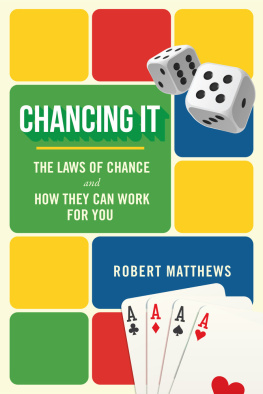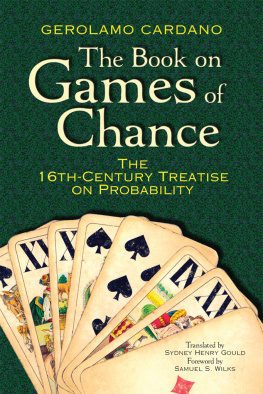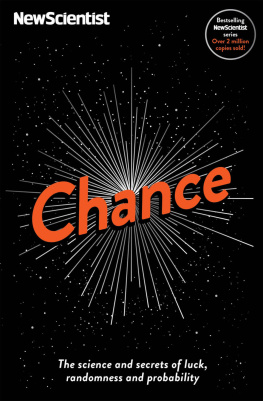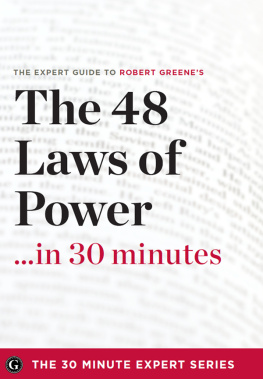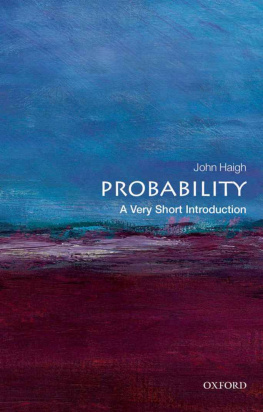Praise for Chancing It
Beguiling Matthews has the knack of explaining things clearly for the non-specialist his enthusiasm contributes to a lively and fascinating narrative Ian Critchley, Sunday Times
Outstanding an extraordinary writer At a time when mathematics needs charismatic ambassadors more than ever, Matthews has written a book of great significance. Oliver Moody, The Times
an excellent handbook for addressing the seemingly illogical logic of chance Fortean Times
Masterly the book equips decision-makers with the tools to arrive at rational decisions that mitigate risks and provide optimal solutions The Hindu
Praise for Why Dont Spiders Stick to Their Webs?
Matthews gives us his wisdom like a beneficent and well-read uncle, entertaining his guests at the dinner table. Brian Clegg, Popular Science Books
Praise for 25 Big Ideas
Robert Matthews has a gift for finding the simple, fascinating stories at the heart of concepts transforming the modern world. John Rennie, former Editor, Scientific American
By the same author
Unravelling the Mind of God:
Mysteries at the Frontiers of Science
25 Big Ideas:
The Science thats Changing our World
Why Dont Spiders Stick to their Webs?
And Other Everyday Mysteries of Scienc e
ROBERT MATTHEWS is one of Britains most experienced and successful science writers. Numerous awards for his writing include the Association of British Science Writers Feature Writer of the Year. His published work includes Unravelling the Mind of God: Mysteries at the Frontiers of Science (Virgin, 1992), 25 Big Ideas: The Science thats Changing our World (Oneworld, 2005), and Why Dont Spiders Stick to their Webs? And Other Everyday Mysteries of Science (Oneworld, 2007). He is currently a Visiting Professor at Aston University, where he specialises in probability and statistics.
First Skyhorse Publishing edition 2017
First published in Great Britain in 2016 by
PROFILE BOOKS LTD
3 Holford Yard
Bevin Way
London
wc1x 9hd
www.profilebooks.com
Copyright Robert Matthews, 2016, 2017
Foreword Larry Gonick, 2017
1 3 5 7 9 10 8 6 4 2
Typeset in Plantin by MacGuru Ltd
The moral right of the author has been asserted.
All rights reserved. No part of this book may be reproduced in any manner without the express written consent of the publisher, except in the case of brief excerpts in critical reviews or articles. All inquiries should be addressed to Skyhorse Publishing, 307 West 36th Street, 11th Floor, New York, NY 10018.
Skyhorse Publishing books may be purchased in bulk at special discounts for sales promotion, corporate gifts, fund-raising, or educational purposes. Special editions can also be created to specifications. For details, contact the Special Sales Department, Skyhorse Publishing, 307 West 36th Street, 11th Floor, New York, NY 10018 or .
Skyhorse and Skyhorse Publishing are registered trademarks of Skyhorse Publishing, Inc., a Delaware corporation.
Visit our website at www.skyhorsepublishing.com.
10 9 8 7 6 5 4 3 2 1
Library of Congress Cataloging-in-Publication Data is available on file.
Cover design by Rain Saukas
Cover photo credit: iStock
ISBN 978-1-5107-2379-5
eISBN 978-1-5107-2381-8
Printed in the United States of America

Contents
For Denise
The smartest person I know,
who unaccountably took a chance on me.

Foreword
by Larry Gonick
W e are an intuitively statistical species, or so I used to think. People who drive to work have a good sense of how random fluctuations in traffic will affect their commute time. We have a pretty good sense of whether to bring an umbrella if theres a chance of rain. Were comfortable with random variations in the size of apples and cucumbers.
On the other hand, I am a terrible poker player.
As recent psychological research has revealed, my experience with poker is typical. People are lousy statisticians. Confronted with risk and uncertainty, we make terrible decisions. We might take some solace in the thought that statistics is a mathematical discipline practiced by adepts better equipped to evaluate uncertainty than the rest of us mentally unwashed, but this fact also turns out to be wrong. Geeks with sophisticated statistical models have blown up world markets. Social scientists and medical researchers, all trained in statistics, have publishedin peer-reviewed journals!decades worth of studies with breakthrough, headline-making results that later turn out to be false. Education experts have decided that small schools are better, a conclusion at odds with statistics, which would have told them, had they thought about it, that small schools are simply more variable . If a disproportionate number of the best fifty schools (by some measure) are small, well then, a disproportionate number of the worst fifty schools will also be small. The distribution is flatter, but this hasnt stopped governments and foundations from pouring billions into making small schools, not so different from my uncle Harry, who blew most of his familys assets trying to beat the stock market. Science has spoken.
Are we then no better than an army of impulsive chimpanzees with hyperdeveloped prefontal cortexes? Is there no hope? This is the question explored by Robert Matthews, an incurable optimist who, by revealing the reasons for the crisis of replication, the case of the vanishing breakthrough, and other statistical malpractice, guides us to more sensible tools for interpreting the uncertainty we all inevitably face in life.
The scientific conclusion that people are lousy statisticians may turn out to be false, after all.

Introduction
O ne Sunday afternoon in April 2004, a 32-year-old Englishman walked into the Plaza Hotel & Casino in Las Vegas with his entire worldly possessions. They amounted to a change of underwear and a cheque. Ashley Revell had sold everything he owned to raise the $135,300 sum printed on the cheque; even the tuxedo he wore was hired. After exchanging the cheque for a depressingly small heap of chips, Revell headed for a roulette table, and did something extraordinary. He bet the lot on a single event: that when the little white ball came to rest, it would end up on red.
Revells decision to choose that colour may have been impulsive, but the event itself wasnt. Hed planned it for months. Hed talked about it with friends, who thought it was a brilliant idea, and with his family, who didnt. Nor did some of the casinos; they may well have been fearful of going down in Vegas folklore as The Casino Where One Man Bet Everything And Lost. The manager of the Plaza certainly looked solemn as Revell placed the chips on the table, and asked him whether he was certain he wanted to go ahead. But nothing seemed likely to deter Revell. Surrounded by a large gathering of onlookers he waited anxiously as the croupier put the ball into the wheel. Then in one swift motion he stepped forward and put all his chips down on red. He watched as the ball slowed, spiralled in and bounced in and out of various pockets, and then came to rest in pocket number 7. Red.
Next page
